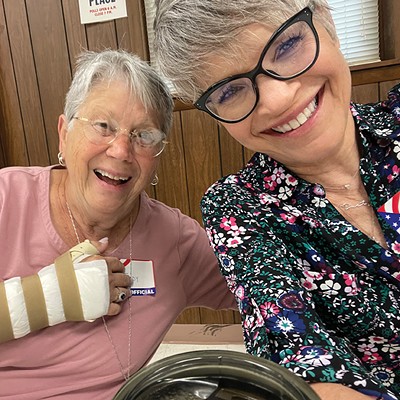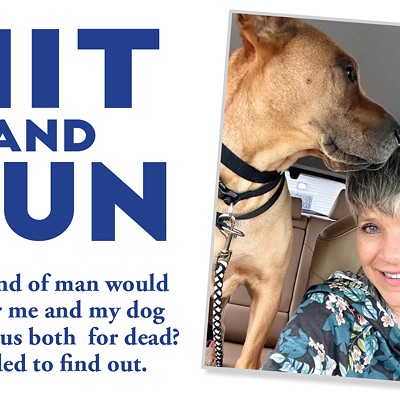What you’re about to read is a true story. I’m stating that promise here at the top, because a few inches into this, you may start to wonder whether I’m making this stuff up, and I want you to know that I’m not. So here goes:
Guy goes to a union meeting. There’s beer available; he has three or four. After the meeting, he drives around to various bars, still drinking, until last call at 3 a.m. He goes home, loads more cold brews into his truck, and continues drinking as he drives to the intersection of 16th and Cook streets — an area where the Springfield Police Department believes hookers hang out.
Sure enough, a woman flags the guy down and asks for a cigarette. Well, our guy doesn’t smoke, so they agree that he will drive her to a nearby convenience store. By now, though, it’s after 5 a.m., and 11 solid hours of boozing have rendered our guy unable to signal all of his lane changes. An SPD officer pulls him over.
Now, because I promised a true story, I have to admit that the documents in my possession don’t specify exactly what the guy said. But it could have been something like “Hey, guess what? I’ve got a uniform and a badge like that, too!”
Yes, I’m talking about Derek Wheeler, the second SPD officer in recent memory to get caught driving stinking drunk. For those keeping score, the first was Don Loftus, whose blood alcohol measured 0.255 shortly after he drove the wrong way down a one-way street and crashed into a car driven by a sober citizen.
Both of these cops — and they are still cops — pleaded guilty and paid the standard first-offender fine. And both got an additional penalty from their employer of three days’ suspension without pay. They might have gotten whacked harder if they’d lost their drivers’ licenses, as most DUI offenders do (patrol officers typically need to drive). But both of these Barneys benefited from another agency’s snafu: the state’s attorney’s office forgot to file paperwork in the Loftus case, and the Sangamon County Sheriff’s Department mishandled Wheeler’s breath-analysis test.
Springfield Police Chief Don Kliment did fire Wheeler — not because he was driving drunk but because he had a prostitute in his truck. See, this shtick involving a woman needing nicotine and a good Samaritan willing to take her to the store is a common ploy used by hookers and johns, as Wheeler knew because he had worked a prostitution-sting operation near 16th and Cook just two nights before his arrest. And, coincidentally, the desperate smoker Wheeler picked up had a record that included two prostitution-related arrests.
However, because his pants were still zipped and the cigarette-seeking woman swore that no transaction had been discussed, the union (the same one whose beer began this adventure) filed a grievance saying that Wheeler shouldn’t have been fired. Their argument, including a recitation of lesser penalties applied to cops caught doing (worse?) stuff, could serve as the basis for a new reality-TV show called Betcha Can’t Guess What a Cop Gets for Doing This!
For example, there’s Officer Pat Selvaggio, who “struck another vehicle in the Police Department garage,” failed to report it, and tried to deny it to Internal Affairs. He got five days off without pay. Then there’s Det. Paul Carpenter, who signed a false affidavit to get a search warrant — a lie that resulted in the annulment of one state and two federal drug convictions — and all he got was a written reprimand.
These decisions make sense, I’m sure, to anybody who has read and absorbed SPD’s five-inch-thick rulebook, “General Orders,” which I haven’t. But to me, out here in the real world, there’s something strange about the concept that a cop can go out and flagrantly violate the same law he’s paid to enforce. I especially don’t understand how crashing into another motorist while driving drunk doesn’t get you fired, yet picking up a prostitute does. I mean, in the latter scenario, the drunken driver would have been taken off the road for a couple of minutes — or however long it takes to “buy cigarettes.”
Last week, an arbitrator ruled in favor of the position put forth by the Policemen’s Benevolent and Protective Agency Unit 5, awarding Wheeler all of his pay back to the time of his arrest, plus the same overtime and holiday bonuses he would have gotten if he’d actually been out on the streets of Springfield protecting and serving. True story.




















